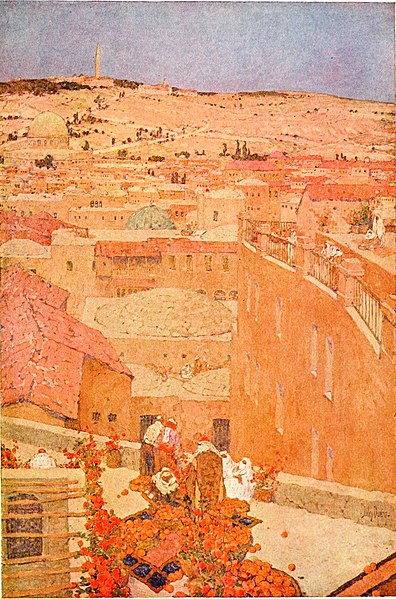
A book newly acquired by the Thammasat University Libraries explains a fascinating discovery that altered views of the Bible.
As everyone knows, the Bible is essential in the Western world, influencing such major religions as Judaism, Christianity, and Islam. Israel and the Dead Sea Scrolls by Edmund Wilson describes how unexpectedly, early manuscript versions of parts of the Bible were found, and how they improved our knowledge of this important book. The author Edmund Wilson (1895–1972) was not a specialist in biblical studies. He was best known as a literary critic and author with wide-ranging interests. Some readers consider him America’s most eminent 20th century literary critic. The Thammasat University Libraries own books by Wilson about such varied subject as Native Americans; the American Civil War; Romantic European literature; modernist authors; modern Russian history and culture; and Wilson’s own life. The Libraries also own analyses of Wilson’s writings and their impact. No other American literary critic has been as interested in as many things as Wilson, or as informed and intelligent. So when he became intrigued by a news item in the 1940s, this resulted in a fascinating book.
The discovery
In 1947, two Arab boys were herding goats on the west side of the Dead Sea. Idly throwing a stone into a cave, one boy heard something breaking. They explored and found large jars made of clay, filled with linen-wrapped manuscripts. The jars were covered in a substance like wax or resin. These turned out to be ancient scrolls, manuscripts of early versions of the Bible. They were important for understanding Jewish and early Christian history. Edmund Wilson told the story so dynamically that even top specialists in the field, such as Salo W. Baron, Professor of Jewish History, Literature and Institutions at Columbia University, approved of his book. Part of the drama surrounding the discovery of the Dead Sea scrolls is that it happened just around the time Israel’s statehood was declared. Amid war and strife, these ancient documents emerged and drew the world’s attention.

Thailand and Israel
Thailand and Israel share a need to solve such problems as irrigation, fish farming, water resources management, and early childhood education, as well as disaster management and preparedness. Many Thai officials have visited Israel on study tours and training courses. These courses are organized by MASHAV, the Israeli agency for international cooperation. Last September, a memorandum of understanding on a development cooperation program was signed by the Thai and Israeli ministries of foreign affairs. Thailand’s International Development Cooperation Agency (TICA) and MASHAV will work more closely together, following the 8th Israel-Thailand Working Group Dialogue. Since MASHAV became active in Thailand in the mid-1960s, over 2,000 Thai professionals have taken courses in Israel in agriculture and education. Many more have also trained in courses given in Thailand, and Thai schools have followed the Israeli model in curriculum and educational philosophy. In January 2004, HRH Princess Maha Chakri Sirindhorn launched a Thai-Israeli agro-technology experimental farm at Khon Kaen University for irrigating high value crops. The Thai-Israel Chamber of Commerce and Thai-Israel Friendship Foundation are active, and HRH Princess Chulabhorn Walailak is involved in advancing scientific cooperation between the two countries. For many years, such Thai researchers as Mom Dusdi Paribatra and M.L. Anong Nilubol, who led the way with early research trips to Israel, have advocated closer ties between the two nations.
A long history.

Thailand and the State of Israel have had official relations since June 1954. The Embassy of Israel in Bangkok opened in 1958. On its official website, His Excellency Simon Roded, Ambassador of the State of Israel to Thailand noted that in 2014, Thailand and Israel celebrated the 60th anniversary of diplomatic relations. Ambassador Roded adds:
During these years we have witnessed the continuous successful cooperation and knowledge sharing in many areas including agriculture, water management, advanced technology, education, culture and medicine. Bilateral trade has reached 1.4 billion USD. Throughout the years, the versatile bilateral relations have been demonstrated by a number historical state visits of Thai dignitaries to Israel, including the HRH Crown Prince Maha Vajiralongkorn, HRH Princess Maha Chakri Sirindhorn and HRH Princess Chulabhorn. These gestures of goodwill were reciprocated by memorable visits to Thailand by Israeli prominent public figures including Foreign Ministers Golda Meir, Moshe Dayan, Abba Eban and Shimon Peres. In 2007, Israel joined the Thai people in celebrating the 80th birthday anniversary of HM the King by planting 120 Israeli pomegranates in Hubkapong, where the first “Thai-Israel Rural Development Project” started in 1966. Thailand is a favorite destination for Israelis. It attracts 150,000 Israeli tourists annually who enjoy Thailand’s rich culture, beautiful landscape and warm hospitality. 24,000 Thai workers are employed in the Israeli agricultural sector. In 2011 Israel and Thailand signed an agreement, first of its kind, which succeeded in eliminating heavy excessive fees paid by migrant workers going to Israel and guaranteeing fair employment conditions. This ground-breaking model of protection of workers’ rights now is being studied around the world. Every year Israel welcomes hundreds of Thai students and professionals attending various training courses mainly in the fields of agriculture, technology and education.
While many Thai agricultural laborers work in Israel, it would be good to develop further university-level intellectual exchanges as well. The QS World University Rankings for 2013/2014 list the Hebrew University of Jerusalem as number 141 in the world. The Technion-Israel Institute of Technology is ranked at 183 and Tel Aviv University at 196. Israeli universities employ several Nobel Prize winners in the fields of chemistry and economics. More top-level academic exchanges with Israel could only benefit the Kingdom.

(all images courtesy of Wikimedia Commons)
